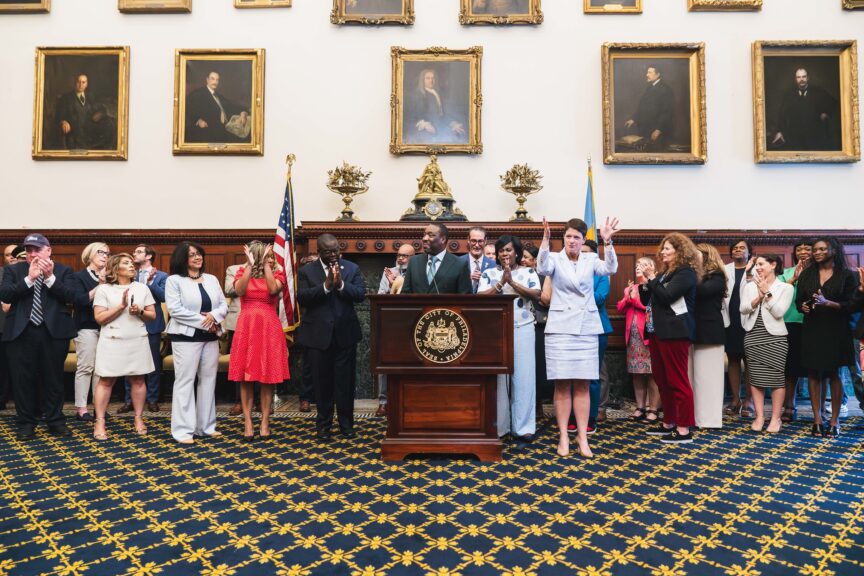Council Also Approves Philadelphia Mayor Cherelle L. Parker’s Housing Opportunities Made Easy (H.O.M.E) Initiative
Philadelphia City Council members approved a $6.84 billion Operating Budget and $6.55 billion Capital Budget for Fiscal Year 2026 (FY 2026) both of which are higher than what Mayor Cherelle L. Parker initially proposed in March of this year.
These critical additional budget investments align with the City’s strategic priorities ensuring that public resources are directed toward initiatives that promote safer communities, and expand educational and youth opportunities, economic growth, high-quality municipal services, affordable housing, and the successful execution of major upcoming events, among others.
The Operating Budget governs the day-to-day financial operations of the city and embodies an estimate of proposed revenues and expenditures for the fiscal year, while the Capital Budget covers proposed expenditures for things like City buildings, facilities, and specialized equipment. The 2026 Fiscal Year begins on July 1.
The proposed FY 2026 budget also has several new investments championed by City Council members, which includes the following:
- Securing an additional $17 million in funding to increase direct grants through the Department of Commerce’s Jumpstart Fund totaling nearly $170 million over five years
- More than $26 million in additional capital funding for critical infrastructure investments
- $3.5 million to increase direct grant funding available to support the City’s Community Development Corporations (CDCs)
- Providing an additional $1.55 million in support for the Defender Association of Philadelphia
- Securing an additional $1.4 million for Mural Arts Philadelphia which will increase the capacity to deliver high-impact programs across various communities throughout Philadelphia
- Dedicating $1.5 million over three years ($500,000 each year) to support homeless youth services
- Adding $1.5 million in arts and culture funding
- Obtaining an additional $2 million for community-based 2026 event activations as the United States commemorates the 250th anniversary of the signing of the Declaration of Independence in 2026
Other items set to receive funding in the FY 2026budget are as follows:
- $30 million for anti-violence grants
- $67 million for a new Forensics Science Center to help the City’s law enforcement departments solve crimes
- $550 million set aside in the Labor Reserve to cover costs for union agreements over the course of the plan.
- $30 million for funding for Vision Zero over six years to increase safety for Philadelphia cyclists, pedestrians and motorists.
- $716 million in operating support for FY 2026 through FY 2030 for SEPTA in addition to $76million in capital support from FY 2026 through FY 2031.
- $41.3 million in new operating investments for education over five years to support various initiatives which is additional funding on top of the City’s more than $280 million grant the City gives the School District annually
Council also overwhelming approved Bill #250568, which authorizes the sale of $800 million in bonds to pay for Mayor Cherelle Parker’s Housing Opportunities Made Easy (H.O.M.E) initiative which aims to build 30,000 housing units in the city and improve and preserve existing homes by tackling the aging infrastructure that many Philadelphians experience.
“I want to thank my fellow Council members and Mayor Cherelle L. Parker for their due diligence in negotiating and reaching an agreement on the new Fiscal Year 2026 Operating and Capital Budgets and new Housing Opportunities Made Easy Plan” said Philadelphia City Council President Kenyatta Johnson (Second District). “This is a balanced budget that reflects the needs of the citizens of Philadelphia.”
“In a city with rich history and resilient people, no one should be forced to sleep on the streets, live in unsafe conditions, or choose between rent and putting food on the table,” he continued. “We must invest in long-term housing solutions – supporting both affordable rental units and pathways to homeownership – so that Philadelphia remains a city where everyone has a place to call home.”
The $800 million borrowing will be both the largest single investment in housing in the history of the city of Philadelphia. The Parker Administration plans to issue a $400 million bond this fall and another in late 2027.
Council is a partner with the Parker Administration in this historic effort to provide safe, stable, and affordable housing throughout Philadelphia that change lives for citizens.
The $800 million H.O.M.E. bonds are issued under a service agreement between the City of Philadelphia and the Philadelphia Redevelopment Authority (PRA) which will be the bondholder.
Bill #250568 also solidifies the partnership between Council and Administration by requiring an annual program and budget statement for approval and the creation of a project review team that will have four people – two each selected by both the Mayor and Council – who will look at any changes to annual H.O.ME funding. Council will also be informed of how each Council district will be impacted by H.O.M.E-related spending on a quarterly basis.
The City Controller’s Office, which has also has fiscal oversight of H.O.M.E. Plan, will conduct reviews of contracts, pre-audit reviews of expenditures, and audit H.O.M.E.-related expenditures. The City Controller will also have the right to observe invoicing vendors during H.O.M.E. construction activities, provided that such observation does not unreasonably interfere with the construction process.
Council also approved legislation to reduce the City’s wage tax and the Business Income and Receipts Tax (BIRT).
The gross receipts rate – total revenue collected in Philadelphia – will go from 0.1415% to 0.141% next year and has annual cuts until the tax is fully eliminated by 2039. The net income tax – or profits – will go from 5.81% to 5.71% next year, before eventually coming down to 2.8% by 2039.
The City’s wage tax for Philadelphia residents will go from 3.75% to 3.74% next year before reaching 3.7% by 2029. The rate for people who live outside Philadelphia but work in the city will go from 3.44% to 3.43% next year and will fall to 3.39% by 2029.
All the Bills approved during the June 12 City Council session will go to Mayor Parker for her signature or possible veto.


